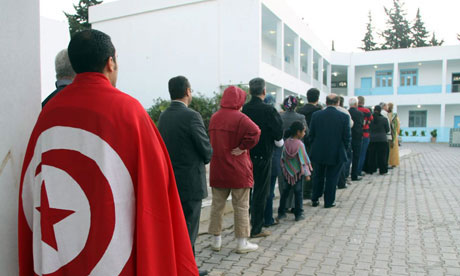UPDATES
Elections in Tunisia
October 24, 2011 | Sharyn Mittelman

On Sunday 23 October, Tunisia held its first truly free election since its independence. Tunisian Hadiya Al Sabie said:
“It’s the first time I have voted from my heart….Not for something that I am forced to vote for, but from my heart.”
The polls have now closed after a voter turnout out of around 90 per cent of the country’s 7 million registered voters. Tunisians voted to elect a 217-seat interim government to write a new constitution and govern until proper parliamentary and presidential elections can be held.
There was also a strong campaign in Tunisia convincing people to vote in the lead up to the election. For example, Michael J Totten posted on his blog an interesting and very amusing advertisement encouraging Tunisians to vote in order to prevent another dictator from emerging – CLICK HERE.
It was Tunisia where the ‘Arab Spring’ began ten months ago, when a vegetable peddler, Mohamed Bouazizi set himself on fire to protest against the Tunisian government’s authoritarian rule. His suicide provoked uprisings in Tunisia that caused its President Zine al-Abidine of 23 years to flee to Saudi Arabia, and inspired similar uprisings across the Middle East including in Egypt, Yemen, Libya, Syria and Bahrain – transforming the Arab world.
The election in Tunisia is being seen by many as the Arab Spring’s “first democratic test” as Tunisians can choose from more than 11,000 candidates – half of them women – representing 80 political parties and several thousand independents.
Tunisia’s generally peaceful transition from authoritarian regime towards democracy is being seen as a template for other Arab countries transitioning into democracy. Its path towards democracy lies in stark contrast to Libya which erupted in civil war, and Egypt where sectarian divides have led to violent clashes between Islamists, Coptic Christians and secularists.
However, Tunisia’s transition towards democracy has unearthed sectarian divides particularly between Islamists and secularists. Traditionally Tunisia has adopted a more liberal and modern approach towards Islam, as compared to other Arab countries. Many secularists in Tunisia now fear that rise of Islamist parties such as the Islamist Ennahdha party may threaten Tunisia’s liberal traditions. The Ennahdha party is predicted to win the biggest share of the vote. Ennahdha has tried to overcome concerns by secularists, yet observers say there is tension inside the party between moderates and extreme Islamists.
Analysis from Washington Institute for Near East Policy scholar David Pollack predicted a plurality for the Islamist Ennahdha (Renaissance) Party — currently led by longtime exiled opposition figure Rachid Ghannouchi – but also sizeable showing for secularist parties. He noted one likely scenario:
The secular, center-left Progressive Democratic Party, led by veteran internal oppositionist Ahmed Nejib Chebbi, will likely come in second with 15-20 percent. And an assortment of mostly secular small parties or independent deputies will almost certainly win the balance of seats, leaving the assembly without clear direction but with considerable latitude for reaching pragmatic compromises on key issues. If these projections hold, some insiders plausibly predict that Ennahdha would form a governing coalition with the smaller, secular, centrist Ettakatol Party and various independents.
Despite the popularity of Ennahdha, he argues an Islamist takeover looks unlikely, noting:
Tunisia has a generally tolerant culture. Although its population is almost uniformly Sunni, three-quarters of the poll respondents said that “non-Muslims should have equal rights in every country, including Tunisia.” To be sure, one-third said a top government priority should be to “make sure that every Tunisian is a believing Muslim,” and one-quarter emphasized giving Muslim scholars and clerics “a lot of influence in the legal system.” Yet fully half admitted that they rarely (15 percent) or never (36 percent) attend mosque services. These factors will probably curb any efforts to impose fundamentalist Islam on the country, even if Islamists win a significant share of the vote and assume a prominent role in the new government.
Pollack discusses many of the factors that will affect both the election and the country’s future, so the whole article is recommended.
Meanwhile, US Senator Joseph Lieberman offers reasons “why Tunisia may offer the Middle East’s most promising soil for democracy”.
It has a real middle class, a strong and entrepreneurial private sector, no significant sectarian or ethnic divisions, a history of religious tolerance, and longstanding equal rights for women.
He argues that if it Tunisia democracy succeed, this example could have flow on effects across the region:
Although Tunisia lacks Egypt’s demographic weight or Libya’s oil wealth, that is not a reason to play down its importance. Tunisia’s revolution has already inspired the rest of the Arab world. The consolidation there of a stable, democratic government working effectively to meet the needs of its people would likewise serve as a powerful model abroad.
The elections result should be known on Tuesday (local time).
Sharyn Mittelman
Tags: Middle East





